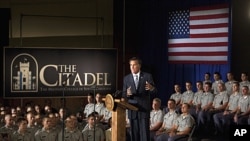In U.S. politics, Republican presidential contender Mitt Romney pledged Friday to strengthen the U.S. military to deal with threats from abroad if he is elected president next year. The former Massachusetts governor and current Republican front-runner gave a sweeping foreign policy address at the Citadel, a military college in South Carolina.
Mitt Romney, while sharply criticizing President Barack Obama, told cadets at the Citadel that when America is strong, the world is safer, and that the United States should embrace its foreign policy challenges and not crawl back into an isolationist shell.
“I will not surrender America’s role in the world," he said. "This is very simple. If you do not want America to be the strongest nation on Earth, I am not your president. You have that president today.”
Romney’s speech came on the 10th anniversary of the U.S.-led war in Afghanistan and he said if elected next year he would order a full review of the transition to the Afghan military handling the war but gave few other details.
He said he would also work to restore U.S. defense capabilities by reversing cuts to the U.S. Navy and missile defense systems.
The former Massachusetts governor listed his top foreign policy concerns as Islamic fundamentalism, the struggle for freedom in the Middle East, the threat of failed nation states and what he called anti-American regimes in Iran, North Korea, Venezuela and Cuba.
“American foreign policy must be prosecuted with clarity and resolve," said Romney. "Our friends and allies have no doubts about where we stand. And neither should our rivals. If the world knows we are resolute, our allies will be comforted and those who wish us harm will be far less tempted to test that resolve.”
Romney's critique was quickly dismissed at the White House by presidential spokesman Jay Carney.
"His record on foreign policy and national security policy speaks for itself. We are stronger. We are safer. We have taken the fight to our principal enemy with a level of aggression and success that is unprecedented," said Carney.
Romney and the other Republican contenders generally focus on the domestic economy and a critique of President Obama in their campaign speeches, and foreign policy has received significantly less attention.
But one of Romney’s main rivals, Texas Governor Rick Perry, recently suggested the U.S. may need to send troops into neighboring Mexico to deal with violent drug cartels.
“The way that we were able to stop the drug cartels in Colombia was with a coordinated effort," said Perry. "It may require our military in Mexico working in concert with them to kill these drug cartels and to keep them off of our border and to destroy their networks.”
Quinnipiac pollster Peter Brown says American voters are far more focused on economic issues for the 2012 election than foreign policy concerns.
“Mr. Obama’s numbers went up somewhat after Osama bin Laden was killed and then they went back down again," he said. "I think that is a reflection of the fact that to voters, issues one through 129 are the economy. Everything else pales.”
Foreign policy issues could come up at the next Republican candidate’s debate, which will be held Tuesday in the early primary state of New Hampshire.
Romney Vows to Strengthen US Military if Elected




